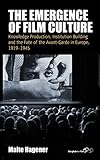The Emergence of Film Culture : Knowledge Production, Institution Building, and the Fate of the Avant-Garde in Europe, 1919–1945 / ed. by Malte Hagener.
Material type: TextSeries: Film Europa ; 16Publisher: New York ; Oxford : Berghahn Books, [2014]Copyright date: ©2014Description: 1 online resource (390 p.)Content type:
TextSeries: Film Europa ; 16Publisher: New York ; Oxford : Berghahn Books, [2014]Copyright date: ©2014Description: 1 online resource (390 p.)Content type: - 9781782384236
- 9781782384243
- 791.43
- PN1995.9.E96 E44 2014
- online - DeGruyter
| Item type | Current library | Call number | URL | Status | Notes | Barcode | |
|---|---|---|---|---|---|---|---|
 eBook
eBook
|
Biblioteca "Angelicum" Pont. Univ. S.Tommaso d'Aquino Nuvola online | online - DeGruyter (Browse shelf(Opens below)) | Online access | Not for loan (Accesso limitato) | Accesso per gli utenti autorizzati / Access for authorized users | (dgr)9781782384243 |
Frontmatter -- Contents -- List of Figures -- Acknowledgements -- Introduction: The Emergence of Film Culture -- I. Formations of Knowledge -- 1. Policing Race: Postcolonial Critique, Censorship and Regulatory Responses to the Cinema in Weimar Film Culture -- 2. The Visible Woman in and against Béla Balázs -- 3. Encounters in Darkened Rooms: Alternative Programming of the Dutch Filmliga, 1927–31 -- 4. When Was Soviet Cinema Born? The Institutionalization of Soviet Film Studies and the Problems of Periodization -- II. Networks of Exchange -- 5. Eastern Avatars: Russian Influence on European Avant- Gardes -- 6. Early Yugoslav Ciné-amateurism: Cinéphilia and the Institutionalization of Film Culture in the Kingdom of Yugoslavia during the Interwar Period -- 7. Soviet–Italian Cinematic Exchanges: Transnational Film Education in the 1930s -- 8. The Avant-Garde, Education and Marketing: The Making of Non-theatrical Film Culture in Interwar Switzerland -- III Emergence of Institutions -- 9. Interwar Film Culture in Sweden: Avant-Garde Transactions in the Emergent Welfare State -- 10. Building the Institution: Luigi Chiarini and Italian Film Culture in the 1930s -- 11. A New Art for a New Society? The Emergence and Development of Film Schools in Europe -- 12. Institutions of Film Culture: Festivals and Archives as Network Nodes -- 13. The German Reich Film Archive in an International Context -- Notes on Contributors -- Select Bibliography -- Index
restricted access online access with authorization star
http://purl.org/coar/access_right/c_16ec
Between the two world wars, a distinct and vibrant film culture emerged in Europe. Film festivals and schools were established; film theory and history was written that took cinema seriously as an art form; and critical writing that created the film canon flourished. This scene was decidedly transnational and creative, overcoming traditional boundaries between theory and practice, and between national and linguistic borders. This new European film culture established film as a valid form of social expression, as an art form, and as a political force to be reckoned with. By examining the extraordinarily rich and creative uses of cinema in the interwar period, we can examine the roots of film culture as we know it today.
Mode of access: Internet via World Wide Web.
In English.
Description based on online resource; title from PDF title page (publisher's Web site, viewed 25. Jun 2024)


